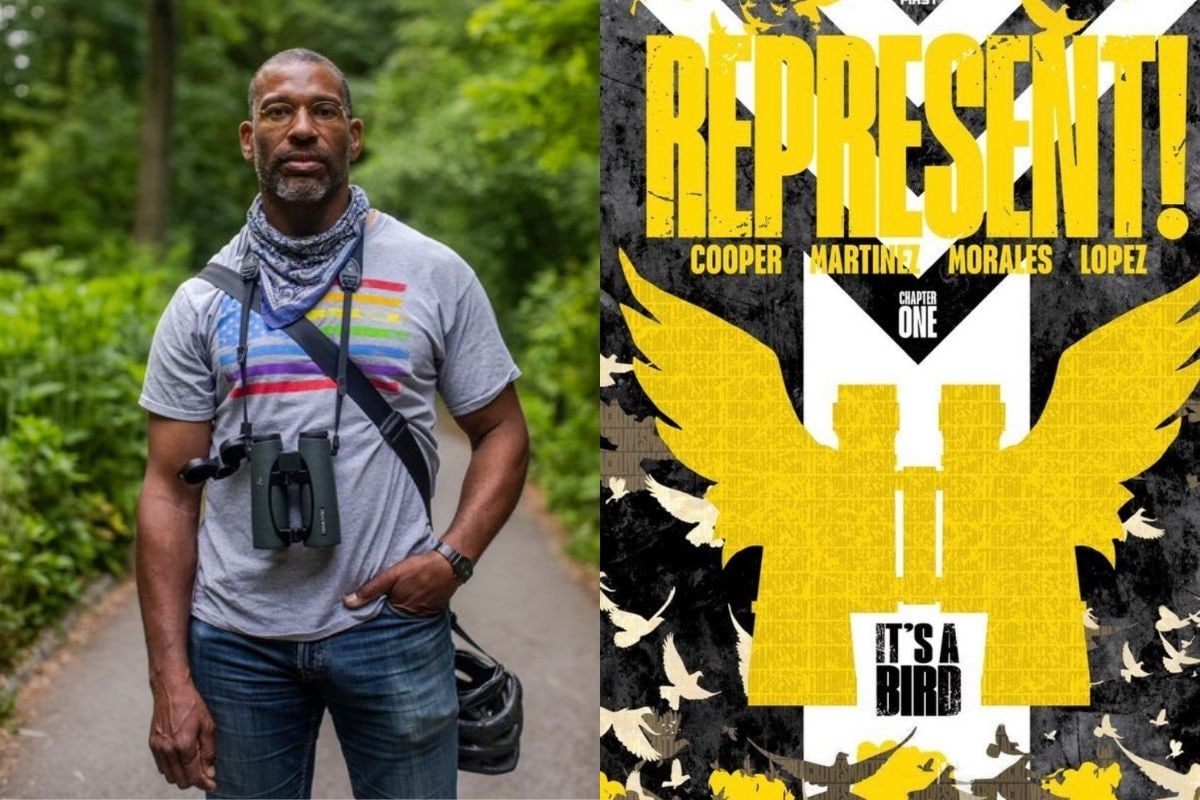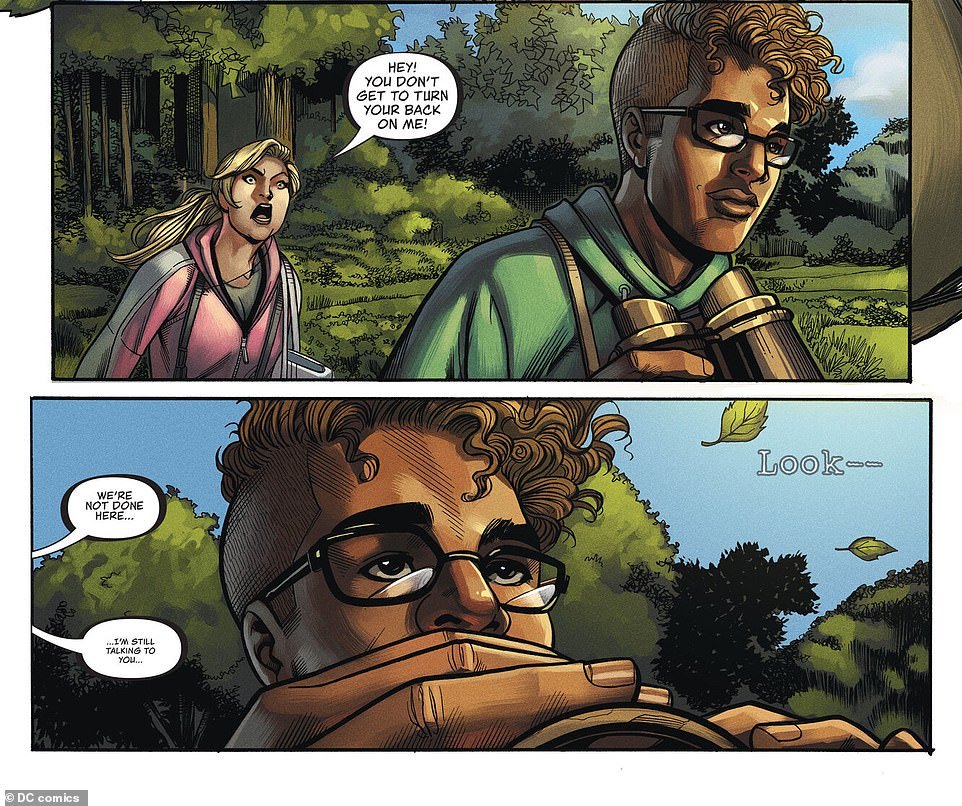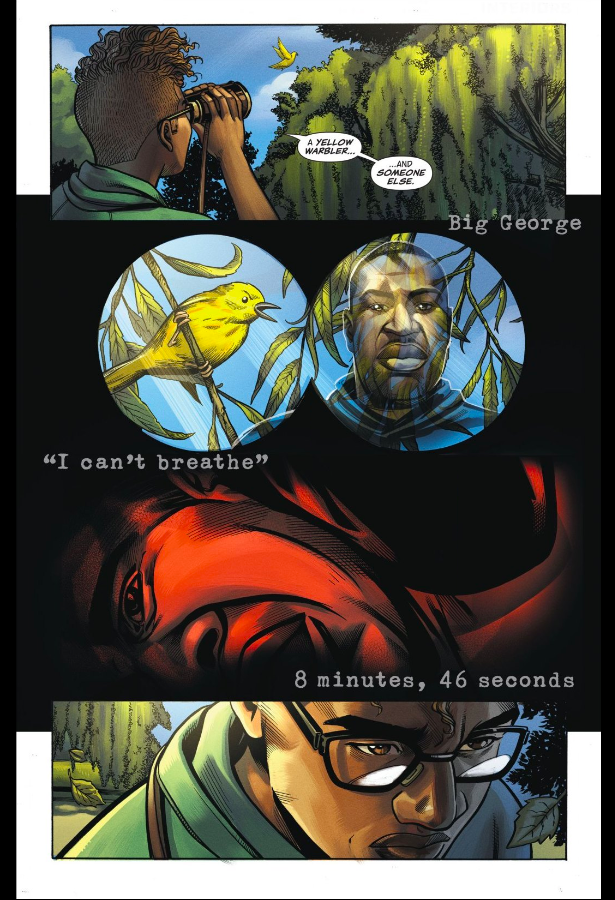
Write what you know.
It’s oft-cited advice for writers both beginning and established.
Thus, Jules, the teenage boy at the center of Christian Cooper’s It’s a Bird, the first entry in DC Comics’ digital-first anthology series Represent!, is a birdwatcher, like the author.
And the binoculars that were a 50th birthday gift from Cooper’s father, a Korean War vet and Civil Rights activist, serve as models for the ones Jules is none too thrilled to receive, despite his grandpa’s belief that they possess special powers.
Cooper, who was was Marvel's first openly gay writer and editor, introducing a number of queer characters before devoting himself to science writing, also draws on recent personal history that is more fraught.
Although the location has shifted from New York City’s Central Park to a suburban green space bordered with large, well-kept homes, including Jules’, the young man’s encounter with an indignant white woman and her off-leash dog should ring any number of bells.

In late May, Cooper became the subject of national news, when he confronted Amy Cooper (no relation) over her violation of park rules, tired of the havoc uncontrolled dogs wreak on birds who call the park home. Ms. Cooper escalated things quickly by calling 911, claiming she was being threatened by an African-American man. Cooper recorded the incident as a matter of protocol, and his sister shared the video on social media later that day.
The same day that George Floyd was killed by police in Minneapolis, Minnesota.
What Jules sees through the lenses of his grandfather's binoculars contains an element of fantasy, but is also deeply rooted in reality—the faces of Amidou Diallo, Breonna Taylor, Floyd, and other Black people who have died as a result of excessive, unwarranted police force.
When DC first approached him about tapping his experience for his first comic in over two decades, Cooper was reluctant:
I thought, “I don’t know, DC Comics? Superheroes? Not sure how that’s going to work.” We kicked around a couple of ideas. They said they had gotten the title, I’m not sure exactly from who, but somebody pretty high up in the DC food chain: “It’s a Bird.” It took me half a beat. “Oh…I get what you did there.” Once I had the title, the story wrote itself.

It’s a Bird artist Aletha E. Martinez, a pioneer whose 20-year career has included inking such superhero heavy hitters as the Black Panther, Iron Man, Batgirl, and X-Men, also pulled from personal experience when rendering Jules’ expression after the binoculars reveal the circumstances of George Floyd’s death:
I saw that look on my son’s face three years ago after we left North Carolina, and we were coming home to New York. We were stopped going into the airport. We travel so often—cons, in and out of the country. These two security guards started to harass us. They wanted to take my purse. “Where are you from?” You hear my voice, there’s no accent in my voice. It ended up with them saying, “You should travel with your passport.” This is after backing us up in the corner, and why? I’m an American citizen born on this soil, so is my son. I don’t need a passport to travel within my country. This is our day and age.
I watched my son’s face change, and he never quite walked up again looking happy going to the airport. Now he has on armor. That face you see? That’s my kid.
It’s a Bird can be read for free on participating digital platforms (see links below), and Cooper is hopeful that it will inspire young people to find out more about some of the real life characters Jules spies through his binoculars. To that end, an appendix touches on some biographical details:
We not only give the bare bones details of how they died, but also a little bit about them, because they were people. They weren’t just want happened to them. I hope young people (are) inspired to keep the focus where it needs to be, which is on those we have lost and how we keep from losing more. There are people who are invested in distracting us right now, and there are people who want to distract us from their failures on so many other things. That’s not what this moment is about. This moment is about the ones we’ve lost, and how we’re going to keep from losing any more. And if you’re not talking about that, I don’t want to hear it.
Read Represent!: It’s a Bird for free on readdc.com, Comixology, Amazon Kindle, Apple Books, and other participating digital platforms.
Read an interview with Cooper and Martinez, from which the quotes in this post are drawn, on DC’s blog.
Related Content:
A New Digital Archive Preserves Black Lives Matter & COVID-19 Street Art
Read Martin Luther King and The Montgomery Story: The Influential 1957 Civil Rights Comic Book
Batman Stars in an Unusual Cartoon Adaptation of Dostoyevsky’s Crime and Punishment
Ayun Halliday is an author, illustrator, theater maker and Chief Primatologist of the East Village Inky zine. Follow her @AyunHalliday.
Central Park Bird Watcher Christian Cooper Writes DC Comics Graphic Novel: It’s Now Free Online is a post from: Open Culture. Follow us on Facebook, Twitter, and Google Plus, or get our Daily Email. And don't miss our big collections of Free Online Courses, Free Online Movies, Free eBooks, Free Audio Books, Free Foreign Language Lessons, and MOOCs.
from Open Culture https://ift.tt/3k5Rpt6
via Ilumina
Comments
Post a Comment